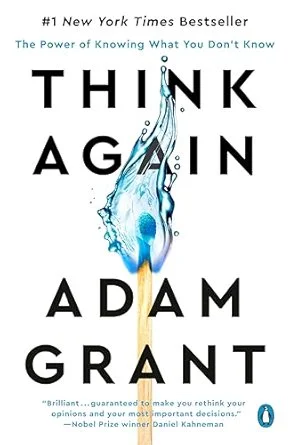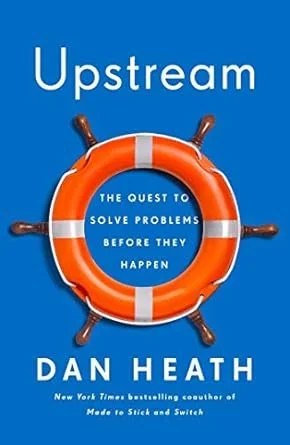Creativity, Inc.
Good to Great
The Lean Startup
Blue Ocean Strategy
Leaders Eat Last
The Innovator's Dilemma
Thinking, Fast and Slow
Lean In
The Power of Habit
Four Thousand Weeks
Creativity, Inc. Good to Great The Lean Startup Blue Ocean Strategy Leaders Eat Last The Innovator's Dilemma Thinking, Fast and Slow Lean In The Power of Habit Four Thousand Weeks
Keep your mind fresh with summaries of the best business books

Think Again
In Think Again, organizational psychologist Adam Grant explores the critical art of rethinking. He reveals how our mental habits—preaching, prosecuting, and politicking—blind us to the truth, and argues that the most successful people adopt a "scientist" mindset. By cultivating confident humility, embracing constructive conflict, and constantly challenging our own assumptions, we can navigate a rapidly changing world with agility and wisdom.

Upstream
In Upstream, Dan Heath challenges the business obsession with reactive problem-solving, urging leaders to prevent fires rather than just fighting them. He identifies the psychological barriers to prevention—Problem Blindness, Lack of Ownership, and Tunneling—and provides a framework for systemic intervention. By leveraging data, aligning stakeholders, and altering environmental levers, you can stop "handling" recurring issues and finally solve them at the source.

Rule Makers, Rule Breakers
In Rule Makers, Rule Breakers, Michele Gelfand reveals the hidden "tight-loose" code that governs human behavior across nations and boardrooms. She explains how perceived threats drive cultures to embrace strict rules, while safety fosters permissiveness. By mastering the "Goldilocks Principle" of cultural balance, leaders can bridge cultural divides, prevent failed mergers, and build teams that are both disciplined and creative.

The 48 Laws of Power
Robert Greene’s bestseller The 48 Laws of Power distills 3,000 years of political intrigue, military strategy, and courtly maneuvering into a ruthless handbook for getting, defending, and disguising power. Drawing on tales from Sun Tzu to Studio 54, Greene presents 48 bite-sized maxims—“Never outshine the master,” “Crush your enemy totally,” “Play a sucker to catch a sucker”—each paired with historical examples, reversals, and practical cautions for modern readers.

Friend & Foe
Friend & Foe—by social-psychologists Adam Galinsky and Maurice Schweitzer—explores the essential tension between cooperation and competition that shapes every relationship, from siblings and spouses to colleagues and nations. Drawing on decades of experiments, brain-scan studies, and real-world case histories, the authors show how power, status, perspective-taking, and fairness cues constantly tilt us toward helping or undermining others—and they offer science-backed strategies for excelling at both modes.

The Obstacle is the Way
In The Obstacle Is the Way, Ryan Holiday draws on ancient Stoic philosophy to teach readers how to harness adversity as a catalyst for growth. By focusing on perception, action, and will, Holiday shows that every challenge holds hidden opportunities for success. Embracing obstacles with resilience and discipline, individuals transform barriers into stepping stones toward personal and professional achievement.

Conflicted
In Conflicted: How Productive Disagreements Lead to Better Outcomes, Ian Leslie explores why healthy conflict can be a catalyst for innovation rather than a destructive force. Drawing on social science research and real-world examples—from corporate boardrooms to diplomatic standoffs—Leslie shows how structured, respectful debates can spark breakthroughs. The result? A compelling case for embracing disagreement as a pathway to better decisions and stronger relationships.

Mind Mapping
In Mind Mapping: Improve Memory, Concentration, Communication, Organization, Creativity, and Time Management, the author demystifies how a simple visual technique can revolutionize personal and professional effectiveness. By translating complex thoughts into structured, colorful diagrams, mind mapping helps individuals remember better, articulate ideas clearly, and manage time more efficiently—ultimately unlocking the creative and organizational potential hidden within our brains.

Mind Your Mindset
Mind Your Mindset: The Science That Shows Success Starts with Your Thinking by Michael Hyatt and Megan Hyatt Miller explores how our thoughts shape our outcomes. Grounded in brain science and practical application, the authors reveal how limiting beliefs can sabotage progress and offer strategies for reframing those beliefs. By doing so, we unlock greater confidence, resilience, and the foundation for true success.

Master Your Emotions
"Master Your Emotions" provides a pragmatic system for gaining control over runaway emotions and negativity cycles. The core approach includes: mapping your emotional patterns, using the W.I.N. framework to interrupt unproductive triggers, rebuilding from resilient positive anchors, and operating from a stance of "emotional ownership" to live more intentionally. With its techniques, you can reign in knee-jerk emotional reactions and better align your presence with your desired impact.

How to Win Friends & Influence People
Nearly a century after its 1936 publication, Dale Carnegie's "How to Win Friends and Influence People" remains profoundly relevant, offering timeless principles for building authentic influence and likability. Despite its dated anecdotes and sexist overtones, the book's core teachings provide an ethical blueprint for connecting deeply with others' motivations and desires, emphasizing empathy, genuine persuasion, and the cultivation of positive energy. Carnegie's strategies for engaging conversation, inspiring action without criticism, and radiating charisma propose a holistic approach to achieving success and leadership. This classic serves as a comprehensive guide for anyone seeking to enhance their influence through noble traits, demonstrating that its principles for personal and professional growth are as impactful today as they were during the Great Depression.

Quiet
In Quiet: The Power of Introverts in a World That Can't Stop Talking, Susan Cain offers a powerful re-examination of our cultural biases. She reveals that our modern world, from open-plan offices to public schools, has been built on the "Extrovert Ideal," often overlooking the unique strengths of introverts. Through compelling research and relatable stories, Cain demonstrates that quiet contemplation, deep listening, and focused work are not weaknesses but essential tools for innovation and leadership. This summary is your guide to understanding why we need a more balanced appreciation of both personality types.

Influence
In Influence, Dr. Robert Cialdini uncovers the six universal principles that cause people to say "yes": Reciprocity, Commitment/Consistency, Social Proof, Liking, Authority, and Scarcity. This essential guide explains the psychology behind these powerful motivators, using real-world examples to show how they can be used for both persuasion and self-defense. Master these concepts to become a more effective, ethical influencer and to recognize when others are trying to manipulate you.

The Power of Habit
In The Power of Habit, Charles Duhigg explores the science behind why we do what we do. He breaks down every habit into a simple three-step "Habit Loop"—Cue, Routine, Reward—and explains that the key to change is to substitute a new routine while keeping the original cue and reward. The book uses compelling stories from business and psychology to illustrate how understanding this loop, and leveraging "keystone habits," can empower anyone to rewrite their patterns and transform their life and organization.

100 Things Every Designer Needs to Know About People
100 Things Every Designer Needs to Know About People by Susan Weinschenk is a practical guide to applying the science of psychology to design. The book translates 100 key research findings about how people see, think, read, and remember into actionable design principles. It explains concepts like cognitive load, social proof, and visual attention to help creators build more intuitive, engaging, and effective products, websites, and applications by designing for how the human brain actually works.

The Happiness Advantage
In The Happiness Advantage, Shawn Achor uses research from positive psychology to argue that happiness is not the reward for success, but the fuel for it. The book outlines seven actionable principles for training your brain for positivity, which is scientifically proven to make you more creative, resilient, and productive. By changing your mindset, building good habits with the "20-Second Rule," and investing in social connections, you can create a powerful competitive edge in work and life.

Never Split The Difference
In Never Split the Difference, former FBI hostage negotiator Chris Voss argues that negotiation is driven by emotional intelligence, not logic. He introduces a toolkit of field-tested techniques like Mirroring, Labeling, and asking Calibrated "How/What" Questions. The goal is to use Tactical Empathy to understand your counterpart's worldview and guide them to a solution—your solution—without the lazy compromise of "splitting the difference."

Thinking, Fast and Slow
In Thinking, Fast and Slow, Daniel Kahneman explains that our minds are governed by two systems: a fast, intuitive, and emotional System 1, and a slow, deliberate, and logical System 2. He reveals how our reliance on System 1's mental shortcuts leads to predictable biases like anchoring and loss aversion. This landmark book provides a powerful framework for understanding human judgment and making better decisions by recognizing our own irrational tendencies.
